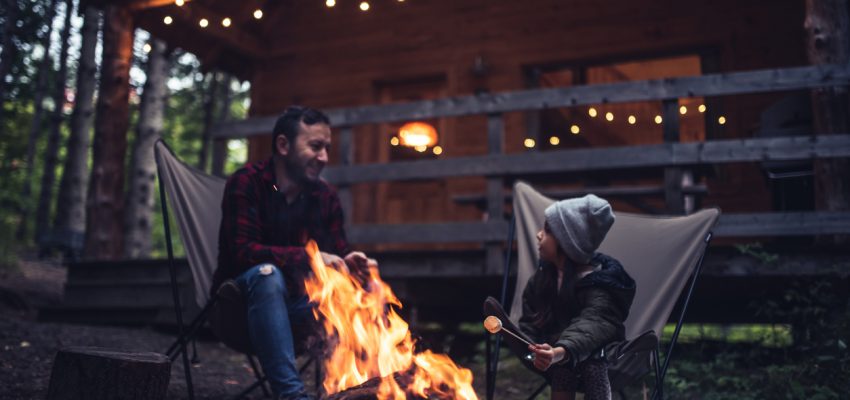While big city life has its charms, people have noticed the benefits off-grid living has to offer. Many people experienced an epiphany while working from home — the ability to be self-reliant and escape the rat race. Now, thanks to improved rural internet options, you really can work from anywhere.
The truth is, living off-grid comes with its own set of challenges that most people aren’t ready to take on.
However, having the right equipment like a suitable off-grid solar kit, preparation and commitment are enough to help save money and live a fuller, simpler life.
Keep reading to learn how to live off-grid in a tiny home and the various benefits of the lifestyle.
Benefits of Living Off-Grid
Living off-grid can present many challenges before you even begin.
Some challenges include finding sources to fund the potential hefty upfront costs, finding the right location, sourcing food, getting clean water and setting up a power source.
But if it’s the lifestyle you want, the benefits are endless. One advantage that has piqued many people’s interest is living life on their terms without unnecessary bills requiring them to work longer hours to pay.
For example, when you live off-grid, you source your water and dispose of your waste in an environmentally friendly way. This discontinues the need to pay for water and sewage bills.
On top of that, you can also save on power bills by generating your electricity with solar panels. One misconception people have about solar energy is that they can’t generate electricity without sunshine.
That’s not necessarily true. Even on cloudy days, solar panels can generate electricity with indirect sunlight.
These days, most solar kits come with a solar panel battery bank that allows you to collect your unused electricity and use it when you need it most.
Off-grid living offers the surprising benefit of the emotionally freeing act of getting rid of unnecessary items and sticking with essentials.
Not only do you get rid of costly furniture, but you also get rid of the gym membership and have limited opportunity to use your high-interest credit card.
The list of benefits goes on, but one thing is clear. Living off-grid allows you to expand your world — one adventure at a time.
Challenges to Living Off-Grid
While living in a tiny home off-grid frees yourself from having to work off a mortgage, you have to deal with challenges like regulations, minimal space and manual labor.
Zoning plays a critical role throughout your tiny home journey. Before you plan on moving your home to a new location, it’s best practice to contact the local authorities.
Typically, the closer to a city you are, the more regulations you must follow. Because of this, many tiny homes move to more rural areas, but this presents another set of challenges.
It is primarily finding water sources and having adequate power. Having solar panels for tiny house are an obvious and popular choice as a power supply.
Source: St. John Imagery/Shutterstock.com
Powering Your Tiny Home
The cheapest option is to go without power. People survived without electricity for years, but it can certainly make life much more difficult.
The best affordable option is to install solar panels. If you require the bare minimum, there are affordable options that go as low as $5,000.
A common mistake is not purchasing enough solar panels or buying too many. You can always contact a company and get an estimate before you buy solar panels, but there’s a more straightforward solution. Or at least one that can help give you a rough estimate so you know you’re not being oversold and you get the exact amount you require.
A solar power calculator is an easy, quick way to determine the number of panels you’ll need to power your new life.
You also have the option to go with an expensive wind power setup or possibly hydropower if you’re near a river or stream. But these two sources are limited when compared to solar.
A Steady Water Source
A water source is one of the factors that requires looking into the local regulations and code.
Before you purchase land, it pays to know if the county requires a city water connection, a cistern tank or a professionally drilled well. While you might be able to hand-drill your well, most counties need it professionally done, which can get expensive.
Rainwater is also another free option, but if you choose that path, you’ll want to ensure it’s filtered and treated to prevent any cases of giardia.
Eliminating Waste
Outhouses are a time-proven solution for a natural human requirement. But if you prefer the comforts of relieving yourself indoors, you can always opt to purchase a composting toilet where allowed.
One thing that most people take for granted is waste management. All the garbage and recycling you collect can add up to a significant amount in a surprisingly short time.
The best way to get rid of it is to take your garbage and recycling to a local dump. If that’s not an option and you live in a rural area, you can research if the local codes allow it to get composted or incinerated in a barrel.
Your Next Adventure
Living off-grid in a tiny home comes with challenges, but it also comes with an endless list of benefits and possibilities. And while it requires a huge commitment, it’s a lifestyle choice that offers a lifetime of fulfillment.
There isn’t a one-size-fits-all way to live off-grid, and the most important thing is that you live your life to your standards and enjoy the adventure!




